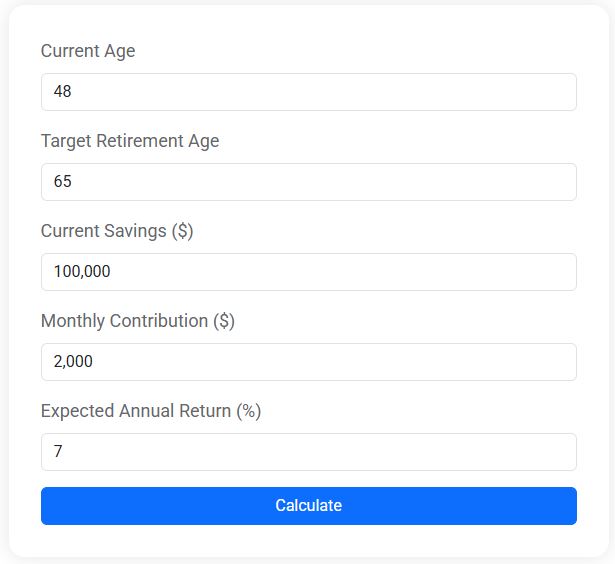5 Common Retirement Mistakes to Avoid at All Costs

Planning for retirement involves avoiding several common mistakes, such as underestimating expenses, relying solely on Social Security, delaying savings, ignoring inflation, and failing to diversify investments. It's crucial to create a realistic budget, have multiple income sources, start saving early, and invest wisely to protect against inflation and market volatility. By addressing these pitfalls proactively, you can build a robust retirement strategy that ensures financial security in your later years.
Planning for retirement can feel like trying to solve a complex puzzle, one with pieces that shift over time and rules that seem to change every decade. But once you get the hang of it, the picture starts to make sense—and the future looks a lot brighter. Unfortunately, it's all too easy to misinterpret the instructions or miss a crucial piece, leaving you scrambling to make ends meet when you should be enjoying your golden years. Let's talk about five common retirement mistakes you absolutely want to avoid. With a little foresight and planning, you can sidestep these pitfalls and set yourself up for a financially secure retirement.
Underestimating Expenses
A common misstep is assuming your expenses will drop significantly in retirement. While you might save on commuting costs or work wardrobe expenses, other costs can creep up unexpectedly. Healthcare, for instance, often becomes a more significant financial burden. According to a report by Fidelity Investments, a 65-year-old couple retiring in 2023 can expect to spend around $315,000 on healthcare throughout retirement. That’s a hefty sum that many overlook.
Let's not forget the leisure activities you finally have time for—travel, hobbies, dining out—all of which can add up quickly. Consider making a detailed retirement budget that includes these lifestyle changes. Speak with retirees you know to get a realistic sense of what they’re spending. Their insights might surprise you and help you plan more accurately.
Relying Solely on Social Security
Social Security is an essential part of retirement income for many, but relying on it as your sole source of income could lead to financial strain. The average Social Security benefit in 2023 is about $1,827 per month, according to the Social Security Administration. While this can be a helpful supplement, it’s often not enough to cover all expenses.
Diversifying your income sources is crucial. Consider other avenues like pensions, part-time work, or investment income. Financial advisor Jane Smith suggests creating a plan that includes multiple revenue streams to provide more stability. She notes, “It’s like a three-legged stool; if one leg is wobbly, you want the others to hold you up.” By ensuring you have various income sources, you’re less likely to find yourself in a precarious position if one falls short.
Early Retirement Calculator
Thinking about retiring early? Our free Early Retirement Calculator helps you figure out exactly how much you need to save and invest to reach financial freedom sooner. Whether you're aiming for early retirement at 55, 50, or even 40, this tool gives you a personalized projection based on your current savings, monthly contributions, and expected return on investment. Start planning your path to financial independence today.
Delaying Savings
The earlier you start saving for retirement, the better, thanks to the power of compound interest. Waiting until your 40s or 50s to start saving can put you at a disadvantage. For example, if you start saving $500 a month at age 25, with an average annual return of 7%, you could have around $1 million by the time you’re 65. Start at 35, and you’ll end up with roughly $500,000, underlining the importance of early saving.
If you're already behind, don’t panic. The key is to increase your savings rate aggressively. Consider automating your savings to make it effortless. And if you receive any windfalls, like a bonus or tax refund, divert a portion toward your retirement fund.
Ignoring Inflation
Inflation is the silent killer of purchasing power, and it doesn't stop when you retire. If your retirement plan doesn’t account for inflation, you might find your dollar doesn’t stretch as far as it used to in 10 or 20 years. Historical data shows that inflation averages about 3% annually, but even at this rate, prices could double in about 24 years.
To combat this, ensure that your investments have the potential to beat inflation. Stocks, real estate, and other growth-oriented assets can provide a hedge against inflation. Consider discussing with a financial planner how to strike a balance between risk and return, aiming to protect your purchasing power over the long haul.
Failing to Diversify Investments
Putting all your eggs in one basket is never a good idea, especially when it comes to retirement savings. Relying heavily on one type of investment, like company stock or bonds, can leave you vulnerable to market swings. Just ask the former employees of companies like Enron or Lehman Brothers, who saw their retirement savings vanish overnight when these companies collapsed.
Diversification is your ally. Spread your investments across a mix of asset classes, such as stocks, bonds, and real estate, to mitigate risk. According to a study by Vanguard, a well-diversified portfolio can reduce the volatility of returns and potentially improve the likelihood of meeting your financial goals. Revisit your asset allocation periodically to ensure it aligns with your risk tolerance and retirement timeline.
Crafting a robust retirement strategy isn't just about avoiding mistakes; it's about being proactive and informed. By understanding these common pitfalls and taking steps to address them, you can pave the way for a secure and enjoyable retirement. Remember, the best time to plant the tree of your retirement plan was yesterday, but the second-best time is now. So grab a coffee, sit down with your budget, and start planting. Your future self will thank you.








